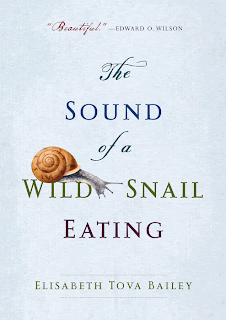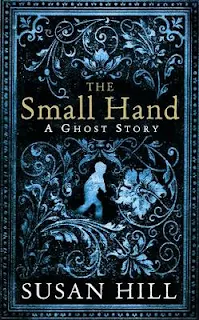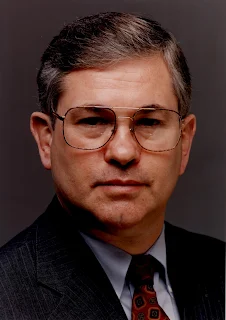The Sound of a Wild Snail Eating is author Elisabeth Tova Bailey's own personal account which begins with her return from a European holiday, when she was struck down by a mysterious illness and confined to her bed.
A caring and thoughtful friend paying a visit to Elisabeth, potted some wild violets and brought them in to place on the author's bedside table, and, noticing a wild woodland snail nearby, places it in the pot with the violets to keep Elisabeth company.
Elisabeth writes that she could hear the snail munching on the petals of the violets, and that it sounded like munching on celery, and the snail quickly becomes her treasured companion. She becomes mesmerised by the snail's night-time adventures and enjoys watching the snail explore, eat, drink and sleep.
Elisabeth is motivated to learn more about her new friend, and the book is peppered with fascinating information about snails which is surprisingly engaging and interesting.
This is an uplifting and inspiring account of compassion and companionship and is a wonderful little read. (And no, you won't need a handkerchief at the end). I would highly recommend The Sound of a Wild Snail Eating to readers of all ages.
My rating = *****
Carpe Librum!
23 October 2011
Review: The Small Hand by Susan Hill
The Small Hand: A Ghost Story by Susan Hill is a short quick read and I knocked it over in no time at all. It was also a gothic novel, and met the requirements for my Gothic Reading Challenge, so that was a bonus!
Adam Snow is an antiquarian bookseller, which is such a delicious occupation for the reader to enjoy and the highlight of the novel. One night Adam takes a wrong turn on his way to visit a client and discovers a dilapidated old manor called The White House. I enjoyed Susan Hill's description of The White House and the history of the once famous gardens, however the 'ghost story' of the title was quite lame.
Although the novel can be called gothic, it wasn't spooky, creepy, haunting or unnerving at all. It had none of the 'ghostly' qualities I would expect in a ghost story and was hoping to find here.
It is for this reason that unfortunately I wouldn't recommend The Small Hand.
My rating = **
Carpe Librum!
Adam Snow is an antiquarian bookseller, which is such a delicious occupation for the reader to enjoy and the highlight of the novel. One night Adam takes a wrong turn on his way to visit a client and discovers a dilapidated old manor called The White House. I enjoyed Susan Hill's description of The White House and the history of the once famous gardens, however the 'ghost story' of the title was quite lame.
Although the novel can be called gothic, it wasn't spooky, creepy, haunting or unnerving at all. It had none of the 'ghostly' qualities I would expect in a ghost story and was hoping to find here.
It is for this reason that unfortunately I wouldn't recommend The Small Hand.
My rating = **
Carpe Librum!
22 October 2011
Review: Gillespie and I by Jane Harris
I was lucky enough to win this copy of Gillespie and I in a competition (together with The Oberservations, also by Jane Harris), so it wasn't a novel I myself chose to read. Written by Jane Harris, Gillespie and I is an historical fiction novel, which is my favourite genre so naturally I was pretty pleased with my win.
Ned Gillespie - of the title - is an artist, painting in Scotland in the late 1880s. Miss Harriet Baxter meets Ned Gillespie briefly at an art exhibition in London, and then several months later, meets his mother and wife in Scotland, and becomes a friend of the family.
The book is narrated by Harriet - now in her late 70s being looked after by a carer - reflecting on her friendship with the Gillespie family.
The novel was moving along at a steady pace and with a fine amount of momentum, when the plot took a most unexpected course. In fact I don't think I could have been more surprised had Jane Harris reached from the pages and slapped me in the face herself!
I had been suspecting the plot was gently building towards a climax centred around one of the family members, however I was completely caught by surprise, and I love it when a book catches you with your guard down.
I won't reveal anything further though, because I don't want to give anything away, however it was a satisfying read; moving between the past and the present and unfurling Harriet's memories of events.
I also enjoyed Harriet's chapters set in the present, where an air of mystery regarding her carer was unfolding, and her thoughts and behaviour at this age were very enjoyable to read!
I won't reveal anything further though, because I don't want to give anything away, however it was a satisfying read; moving between the past and the present and unfurling Harriet's memories of events.
I also enjoyed Harriet's chapters set in the present, where an air of mystery regarding her carer was unfolding, and her thoughts and behaviour at this age were very enjoyable to read!
My rating = ***1/2
Carpe Librum!
16 October 2011
Interview with William F. Brown, author of The Undertaker
William F. Brown is the author of The Undertaker, which I reviewed last month, giving it 4 stars.
William tells us more about his novel and his writing during his interview with me below.
Where did the idea for your novel The Undertaker originate?
Each of my novels starts some kind of a simple concept, a one-liner or ‘slug line’ as they call it in screen plays. The Undertaker began with, “a guy opens the newspaper and sees his own obituary.” I then start asking the questions of who, why, and what, and craft characters which fit the various story needs. I then let them take over and drive it.
My most successful novel, Thursday at Noon, began with, “a burned out CIA agent in Cairo stumbles home one night and finds a severed human head sitting on his rear stoop.” Through the Glass Darkly begins with, “a guy’s in the window seat of an air liner coming in to land at O’Hare. He looks down, and sees a man killing a woman on a roof as it flashes by below.” Then, I start asking the questions. Anyway, that’s how I do it.
How did you come up with the character of Tinkerton? Did someone you know (perhaps from the US Army) inspire the character?
For some reason I do really good villains, probably better than my heroes or lead female characters. They usually don’t drive the story, so I can have more fun with them and write them a little ‘over the top’. Tinkerton is one of my favorites, but he came 100% out of my head. Ya gotta love an evil lawyer! As my other books come on live over the next 6 months or so, you’ll see my other bad guys are pretty well drawn, too.
Can you tell us more about your own time in the US Army?
To me, it was the greatest learning experience of my life. I worked for good people and had incredible responsibilities at a very young age. That let me ‘spread my wings and learn what I can do. I did computer and systems work in Germany and was a drug counselor and company commander in Vietnam. I really wasn’t in combat, but the entire experience of being responsible for a lot of other guys teaches you about people and is life-changing.
Having published several novels now, do you have any particular writing habits?
I’ve written six now, but writing is about re-writing and it feels like I’ve written a hundred. I try to work every day and get into some regular schedule, so as to keep the threads alive. I use a computer and Word, and hate the inevitable distractions that seem determined to interrupt your best ideas.
When do you do your best work and can you describe your working space?
My best ideas seem to come in the shower or when I am running. I tend to do my best writing at night, but sometimes during the day when I have it going. My work space is a small office on the front of our condo. I used to have a problem with neck cramps when I had my monitor on the desk, so I bought a desk which has a glass center section and the monitor down under the glass below desktop level, so I’m looking down. That solved the neck problem. Beyond that, I like the desk neat, I have classical music or jazz playing, and want to be left alone. The secret to all writing is to get your butt in the chair and do it.
Do you get an opportunity to read much, and if so, who are some of your favorite authors?
It’s hard to do both. I read on trips or when I’m between books. My favorites are Michael Connolly, Stuart Woods, Lee Child, Daniel Silva, Dennis Lehane, Vince Flynn, Robert Crais, and Robert B. Parker, Hemingway, and a lot of others.
What do you have planned for 2012?
On the writing front, I have two novels presently out with my agent making their rounds with publishers . . . A War of Whispers and Winner Lose All. I am about half finished with a new one called One True Shot, and am simultaneously working on Through the Glass Darkly.
I will soon have my rights back on Thursday at Noon, which St. Martin published in hardback, and I will then put it out in e-book format. I have the first chapters of all my novels available out there, so folks can take a look. And, I’ve continued to work Facebook (William F. Brown) and to track down book blog and reviewer sites. We used to say “writing is editing.” Now, we say writing is promoting.” Anyway, that’s enough work for ten years!
That's certainly a lot of work! Thanks for stopping by Bill!
William tells us more about his novel and his writing during his interview with me below.
Where did the idea for your novel The Undertaker originate?
Each of my novels starts some kind of a simple concept, a one-liner or ‘slug line’ as they call it in screen plays. The Undertaker began with, “a guy opens the newspaper and sees his own obituary.” I then start asking the questions of who, why, and what, and craft characters which fit the various story needs. I then let them take over and drive it.
My most successful novel, Thursday at Noon, began with, “a burned out CIA agent in Cairo stumbles home one night and finds a severed human head sitting on his rear stoop.” Through the Glass Darkly begins with, “a guy’s in the window seat of an air liner coming in to land at O’Hare. He looks down, and sees a man killing a woman on a roof as it flashes by below.” Then, I start asking the questions. Anyway, that’s how I do it.
How did you come up with the character of Tinkerton? Did someone you know (perhaps from the US Army) inspire the character?
For some reason I do really good villains, probably better than my heroes or lead female characters. They usually don’t drive the story, so I can have more fun with them and write them a little ‘over the top’. Tinkerton is one of my favorites, but he came 100% out of my head. Ya gotta love an evil lawyer! As my other books come on live over the next 6 months or so, you’ll see my other bad guys are pretty well drawn, too.
Can you tell us more about your own time in the US Army?
To me, it was the greatest learning experience of my life. I worked for good people and had incredible responsibilities at a very young age. That let me ‘spread my wings and learn what I can do. I did computer and systems work in Germany and was a drug counselor and company commander in Vietnam. I really wasn’t in combat, but the entire experience of being responsible for a lot of other guys teaches you about people and is life-changing.
Having published several novels now, do you have any particular writing habits?
I’ve written six now, but writing is about re-writing and it feels like I’ve written a hundred. I try to work every day and get into some regular schedule, so as to keep the threads alive. I use a computer and Word, and hate the inevitable distractions that seem determined to interrupt your best ideas.
When do you do your best work and can you describe your working space?
My best ideas seem to come in the shower or when I am running. I tend to do my best writing at night, but sometimes during the day when I have it going. My work space is a small office on the front of our condo. I used to have a problem with neck cramps when I had my monitor on the desk, so I bought a desk which has a glass center section and the monitor down under the glass below desktop level, so I’m looking down. That solved the neck problem. Beyond that, I like the desk neat, I have classical music or jazz playing, and want to be left alone. The secret to all writing is to get your butt in the chair and do it.
Do you get an opportunity to read much, and if so, who are some of your favorite authors?
It’s hard to do both. I read on trips or when I’m between books. My favorites are Michael Connolly, Stuart Woods, Lee Child, Daniel Silva, Dennis Lehane, Vince Flynn, Robert Crais, and Robert B. Parker, Hemingway, and a lot of others.
What do you have planned for 2012?
On the writing front, I have two novels presently out with my agent making their rounds with publishers . . . A War of Whispers and Winner Lose All. I am about half finished with a new one called One True Shot, and am simultaneously working on Through the Glass Darkly.
I will soon have my rights back on Thursday at Noon, which St. Martin published in hardback, and I will then put it out in e-book format. I have the first chapters of all my novels available out there, so folks can take a look. And, I’ve continued to work Facebook (William F. Brown) and to track down book blog and reviewer sites. We used to say “writing is editing.” Now, we say writing is promoting.” Anyway, that’s enough work for ten years!
That's certainly a lot of work! Thanks for stopping by Bill!
06 October 2011
Review: The Undertaker by William F. Brown
* From author for review *
The Undertaker by William F. Brown was a fast-paced and thrilling read. I was hooked from the very beginning, when Peter Talbott, a software engineer living in Boston, still grieving from the loss of his wife, is questioned by Gino Parini about an obituary featuring his and his wife's names in an Indiana newspaper.
Pete believes it to be a bizarre misunderstanding but he's angry that his wife's name is mentioned so he decides to ignore advice from Gino Parini to drop it. What does he do next? He heads to Indiana to attend his own funeral to see what he can find out, of course!
I mean, what's not to love in a plot like this? His trip to the Funeral Home was electric, and the book was simply unputdownable at this point. (It was an e-book, so perhaps what I really mean is that I couldn't bring myself to switch the power button off).
The tension and action just keep on building, however in many thrillers, often the main character makes ridiculous choices that make you groan out loud, "no", or "don't do that." I was pleasantly surprised to find this wasn't the case here.
There is a 'girl' in The Undertaker, and a little romance, however don't fret, she isn't a ditzy, blonde bombshell. Author William Brown manages to strike a really good balance between avoiding the usual stereotypes, and also steering clear of the unbelievable sexy Lara Croft style character.
The plot was cleverly layered and always swiftly moving, engaging and entertaining. Thoroughly recommended for all readers who enjoy thrillers, suspense, mystery and crime novels.
And now for the best part, leave a comment below for your chance to win a free copy of the e-book, courtesy of the author.
My rating = ****
Carpe Librum!
And now for the best part, leave a comment below for your chance to win a free copy of the e-book, courtesy of the author.
My rating = ****
Carpe Librum!
Subscribe to:
Posts (Atom)







































